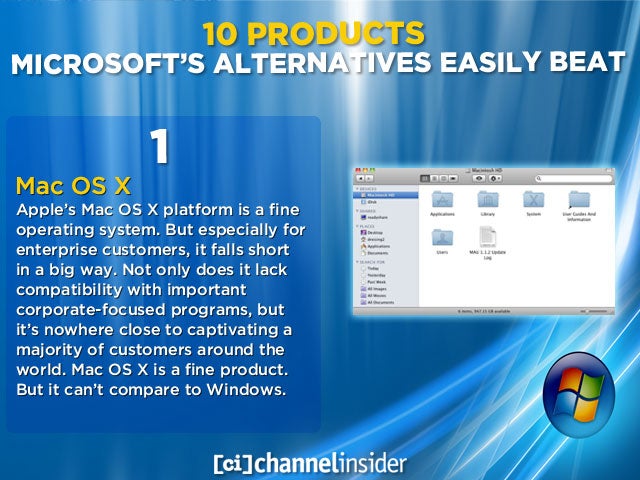 10 Products Microsoft’s Alternatives Easily Beat
10 Products Microsoft’s Alternatives Easily Beat
1. Mac OS XApple’s Mac OS X platform is a fine operating system. But especially for enterprise customers, it falls short in a big way. Not only does it lack compatibility with important corporate-focused programs, but it’s nowhere close to captivating a majority of customers around the world. Mac OS X is a fine product. But it can’t compare to Windows.
 No Title
No Title
2. Apple’s iWorkApple’s iWork platform is designed to give the company’s Mac OS X users an alternative to Windows. But after using it for a little while, most folks will quickly find out that it can’t compete with Microsoft Office on any level. It’s a nice productivity suite, but it won’t match Microsoft’s anytime soon.
 No Title
No Title
3. Google DocsOffice Web Apps might be in its infancy, but Microsoft’s alternative to Google Docs is already appealing to those who realize that the search giant’s alternative has some real issues to contend with. Google Docs isn’t a bad platform by any means — it works quite well in most cases — but Office Web Apps is simply better. And since it has direct integration with the desktop version of Microsoft’s productivity suite, it’s probably the best choice for enterprise customers.
 No Title
No Title
4. Google MapsQuite a few people opt for Google Maps when they want to find directions to a particular location, but when they use Bing Maps for the first time, they will quickly discover why Microsoft’s alternative is slightly better. Not only does it offer a better interface, but its satellite views of locations are much better than Google’s.
 No Title
No Title
5. Google’s Cloud EffortsGoogle has been trying desperately to prove to the enterprise that it provides a viable cloud-based solution for customers. And although the company has come a long way in doing just that, it has much further to go if it wants to catch up to Microsoft. The software company’s Azure is quite nice. And with the Web-based Office Web Apps finally starting to gain some ground in the productivity market, for now it seems Microsoft is still in the lead.
 No Title
No Title
6. BlackBerry OSRIM’s BlackBerry operating system might be the most viable offering to enterprise customers right now, but Windows Phone 7 could have the trump card when it’s released next month. The operating system features a unique new design, and delivers full-fledged Windows integration, which should be enough to captivate some customers. BlackBerry OS is great and all, but Windows Phone 7 looks to be better.
 No Title
No Title
7. Any Collaboration SoftwareNo matter what kind of collaboration software a company would like to use, they won’t find a better solution than Sharepoint. Over the past couple years, Microsoft has spent considerable time improving its collaboration option. And in the process, the company has made it a must-have for just about any organization.
 No Title
No Title
8. A Non-Windows NetbookMicrosoft might not offer netbooks itself, but the company’s netbook-friendly Windows 7 is easily better than Linux. Realizing that, an increasing number of consumers and enterprise customers have been buying Windows 7-based netbooks. And in the process, Microsoft has proven that when it comes to operating systems, it really does know what it’s doing.
 No Title
No Title
9. Norton Anti-VirusWindows security is a major concern for consumers and enterprise customers. And that won’t be changing anytime soon. But as Symantec’s Norton security suite gets all the attention in the space, it’s actually Microsoft’s Defender software that beats all others. Even better, the software is free, which makes it all the more appealing. It might sound odd, but the company that has been most at fault for Windows insecurity is offering the best solution to address that.
 No Title
No Title
10. Windows VistaIt might seem odd to include a Microsoft product in a roundup showing how Microsoft is beating the competition, but Windows Vista is one of those products that Microsoft is currently beating. As mentioned by just about every Windows critic around, Vista was a failure for Microsoft. But Windows 7 helped Microsoft regain its focus. And now, the company’s latest operating system is delivering the experience that Vista should have offered from the start.

